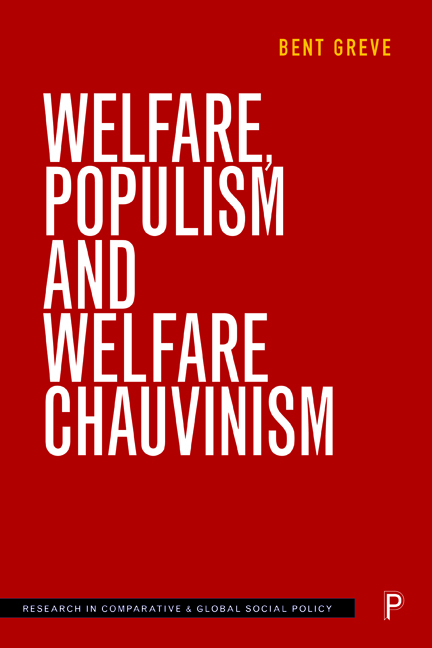Book contents
- Frontmatter
- Contents
- List of tables and figures
- Preface from the series editors
- Preface
- 1 What is it all about?
- 2 Basic concepts
- 3 Why inequality matters
- 4 Dualisation and the labour market
- 5 What form has the development in welfare spending taken?
- 6 Has social cohesion been eroded?
- 7 What do we know about citizens’ perception of the welfare state?
- 8 Populism, welfare chauvinism and hostility towards immigrants
- 9 Concluding remarks
- Index
4 - Dualisation and the labour market
Published online by Cambridge University Press: 27 April 2022
- Frontmatter
- Contents
- List of tables and figures
- Preface from the series editors
- Preface
- 1 What is it all about?
- 2 Basic concepts
- 3 Why inequality matters
- 4 Dualisation and the labour market
- 5 What form has the development in welfare spending taken?
- 6 Has social cohesion been eroded?
- 7 What do we know about citizens’ perception of the welfare state?
- 8 Populism, welfare chauvinism and hostility towards immigrants
- 9 Concluding remarks
- Index
Summary
Introduction
Having a job is central for an individual's standard of living, quality of life and feeling of being part of society. Dualisation in the labour market can thereby be a central issue having an impact on, and seemingly moving countries towards, increasingly split societies – especially as it might also negatively influence the ability to finance welfare states. Even more simply argued, the need for jobs for persons with different qualifications, including fewer jobs for low-skilled persons, can cause a strong reduction in people's trust in the future, both for themselves and their children. This can further influence the perception of what the state is able to do, and the state might even be blamed for the loss of jobs, despite the fact that, in reality, the state could not have influenced it. The increased divide in the labour market, and the related ability to be included in, or excluded from, society and access to different goods and services, might therefore be an explanation as to why populist parties have had the ability to gain support. Therefore, this chapter depicts, at an overall level, how and what the consequences for social cohesion have been of the developments in the labour market of recent years. It first includes a short description of possible future trends in the labour market and how they can influence welfare state developments. It further includes reference to the Europeanisation and globalisation discussion as this is also an issue in relation to labour market developments, including how this might have an impact on preferences for state intervention.
Technology and jobs
Throughout history, technology has had an impact on the number of jobs. In general, there are two interpretations of the impact of technology on jobs: a bright side and a dark side (Greve, 2017). Historically, the argument has been that although new technology destroys jobs, new jobs will also be created. This is with reference to the movement from the countryside to cities, the Industrial Revolution and the coming of age of the use of new technology. The question is whether it is different this time (Mokyr et al, 2015).
- Type
- Chapter
- Information
- Welfare, Populism and Welfare Chauvinism , pp. 57 - 76Publisher: Bristol University PressPrint publication year: 2019



